Hey there, fellow dog lover! I’m Dr. Candy Akers, your friendly holistic veterinarian. Today, we’re going to talk about a topic that’s close to my heart – Basset Fauve de Bretagne Eye Health. If you’re the proud parent of this adorable breed, you’re well aware of their expressive eyes. But did you know these beautiful eyes can also be prone to various health issues?
As a vet, one of the most common concerns I hear from Basset Fauve de Bretagne parents is about their pup’s eyes. This breed’s unique eye structure can predispose them to certain eye conditions. But don’t worry, I’m here to guide you through this. We’ll discuss the common eye problems your pup might face, how to prevent them, and the role of diet and environment in maintaining their eye health.
Whether you’re dealing with “Basset Fauve de Bretagne Eye Problems” or just looking for “Eye Health Tips for Basset Fauve de Bretagne”, you’ve come to the right place. So, let’s dive right in and learn how to keep those adorable eyes healthy and bright!
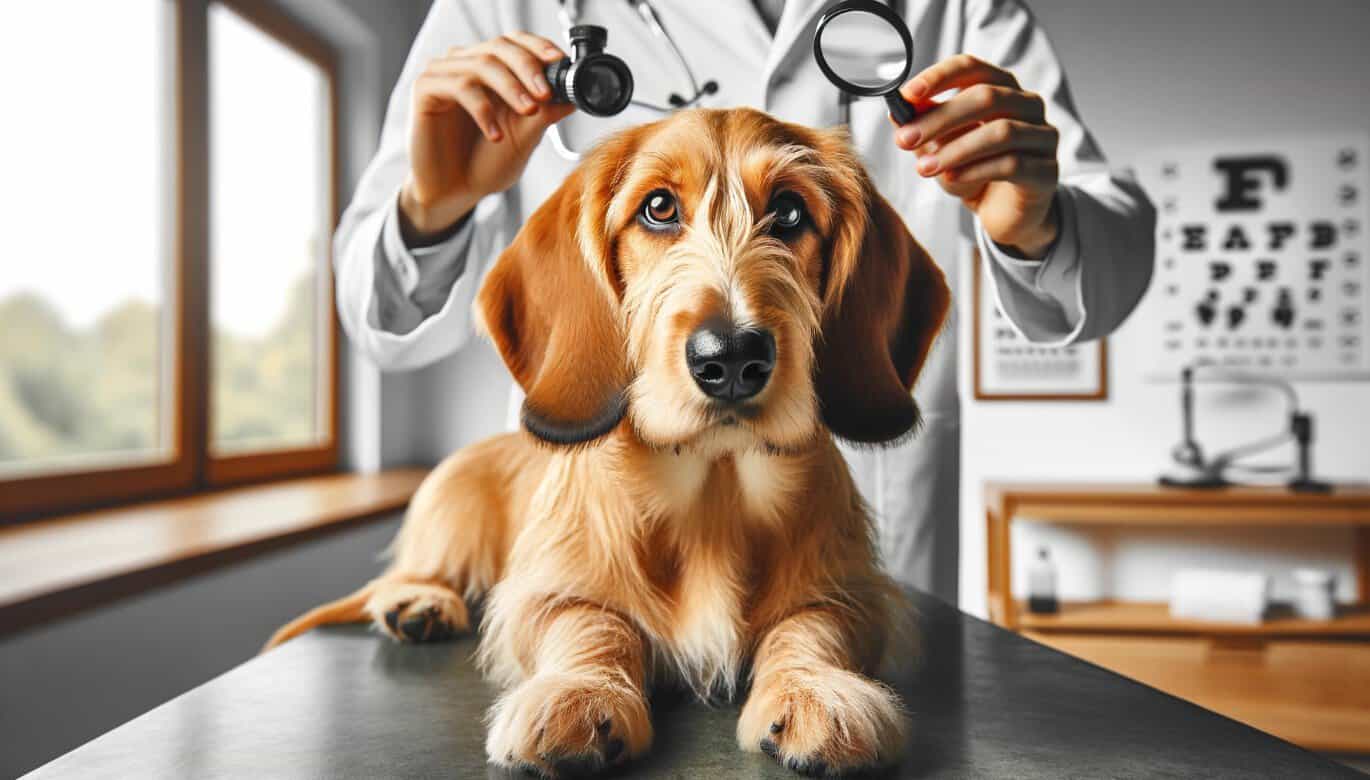
Understanding Basset Fauve de Bretagne Specific Eye Structure
Unlocking the secrets to your Basset Fauve de Bretagne’s eye health begins with comprehending the unique structure of their eyes. This understanding is crucial in maintaining their overall eye health and ensuring they enjoy their playful and adventurous life to the fullest.
The Basset Fauve de Bretagne, a charming and intelligent breed, possesses a distinctive eye structure that sets them apart. Their eyes are dark, expressive, and slightly oval. They are not very large but are well open and lively, giving them their distinctive intelligent and alert expression.
Their eyelids fit well to the eyeball, and there should be no looseness or drooping. This breed’s unique eye structure can sometimes lead to certain health issues, so it’s crucial to understand these characteristics to detect any signs of potential problems early.
One unique feature of the Basset Fauve de Bretagne’s eyes is their haw, or third eyelid. This is a membrane located in the inner corner of the eye that can sometimes be seen when your dog is sleepy or unwell. It plays a crucial role in protecting the eye and producing tears. However, this third eyelid can sometimes be prone to conditions like Cherry Eye, especially in breeds with more prominent eyes.
Additionally, the breed’s characteristic expression is partially due to their somewhat prominent eyes. While this gives them their adorable and expressive look, it also makes their eyes more exposed and vulnerable to injury and infection. Therefore, it’s essential to monitor their eyes regularly for any signs of redness, discharge, or discomfort.
Remember, your Basset Fauve de Bretagne’s eyes are the windows to their world, and it’s our responsibility, as their loving and caring parents, to ensure they have the best vision possible. So, let’s dive deeper into the common eye issues this breed faces and how we can help prevent them.
Common Eye Issues In Basset Fauve de Bretagne
As a veterinarian, I have encountered a variety of eye issues in Basset Fauve de Bretagne dogs. This breed is particularly susceptible to certain eye problems due to their unique structure and genetic predisposition. Understanding these common issues can help you take necessary steps to protect your pet’s Basset Fauve de Bretagne eye health.
- Cherry Eye: This condition occurs when the gland in the third eyelid becomes swollen and protrudes, resembling a cherry. Though not life-threatening, it may cause discomfort and requires veterinary attention.
- Entropion: This is a genetic condition where the eyelid rolls inward, causing the lashes to rub against the eye surface, leading to irritation and potentially serious damage.
- Canine Glaucoma: This is a serious condition characterized by increased pressure in the eye, leading to pain and potential blindness if not treated promptly.
- Cataracts: This is a clouding of the lens inside the eye which can impair vision and eventually lead to blindness.
- Conjunctivitis: Also known as pink eye, this is an inflammation of the conjunctiva, the mucous membrane that lines the inside of the eyelids and covers the white part of the eye.
- Dry Eye: Medically known as Keratoconjunctivitis Sicca (KCS), this condition is characterized by a decrease in tear production, leading to dry, irritated eyes.
These are just a few of the common eye problems that can affect your Basset Fauve de Bretagne’s eye health. It’s important to regularly check your dog’s eyes for any signs of irritation, redness, or unusual discharge. Also, ensure to maintain regular vet check-ups for early detection and treatment of any potential eye issues.
Remember, your dog’s eyes are a crucial part of their overall health and well-being. Ensuring proper Basset Fauve de Bretagne eye care can help your pet live a happy, healthy, and active life.
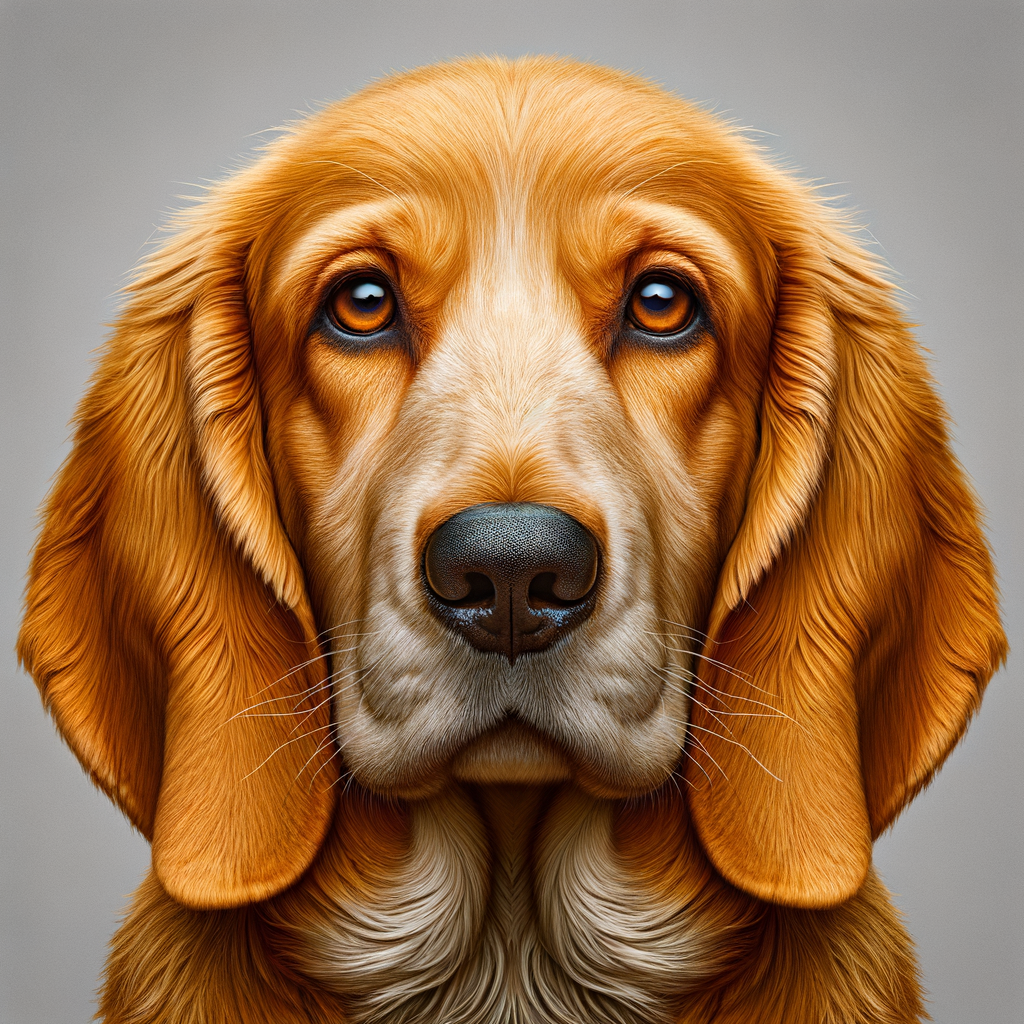
Prevention of Eye Problems in Basset Fauve de Bretagne
Ensuring your Basset Fauve de Bretagne gets the right nutrients for optimal eye health is essential for maintaining clear vision and preventing age-related issues. Natural, nutrient-rich foods and supplements can play a key role in supporting their eyesight. From vitamin A-packed freeze-dried liver treats to antioxidant-rich blueberries and targeted supplements like Eyeplex by Standard Process, there are several ways to nourish your dog’s eyes. In this section, we’ll explore how these powerful ingredients contribute to long-term vision health and overall well-being.
Eyeplex by Standard Process
Eyeplex by Standard Process is a specialized supplement designed to support your Basset Fauve de Bretagne’s eye health with a blend of essential nutrients. Formulated with key vitamins, minerals, and antioxidants, Eyeplex helps protect against oxidative stress, supports retinal function, and promotes overall vision health. Ingredients like vitamin A, vitamin C, and zinc contribute to maintaining strong eyesight, while whole food ingredients provide additional phytonutrients for cellular protection. Adding Eyeplex to your Basset Fauve de Bretagne’s diet can be especially beneficial for aging dogs or breeds prone to eye conditions, offering targeted nutritional support to keep their vision sharp and healthy for years to come.
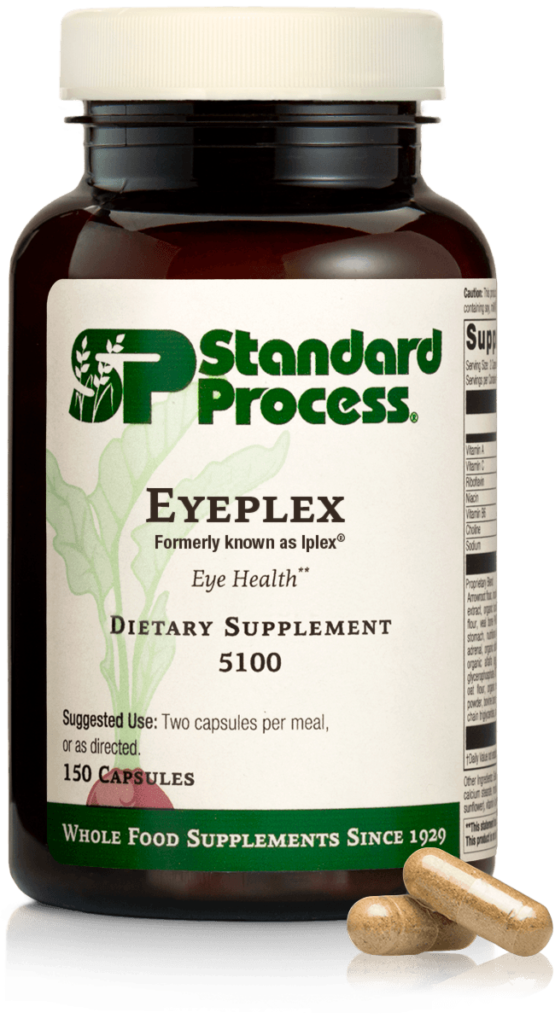
Freeze-Dried Blueberries
Freeze-dried blueberries are a powerhouse of antioxidants that can help protect your Basset Fauve de Bretagne’s eyes from oxidative stress and age-related damage. Rich in vitamins C and E, as well as anthocyanins, these tiny but mighty berries help combat free radicals that can contribute to eye diseases like cataracts and macular degeneration. Incorporating freeze-dried blueberries into your dog’s diet provides a natural and delicious way to support retinal health, reduce inflammation, and promote overall vision longevity. Plus, they’re a low-calorie, dog-friendly treat that makes a great addition to a balanced diet for long-term eye health.
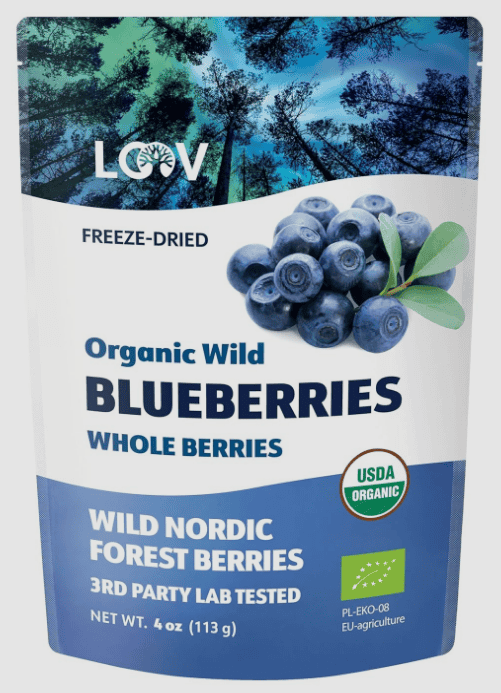
Freeze-Dried Liver
Freeze-dried liver treats are an excellent natural source of vitamin A, an essential nutrient for your Basset Fauve de Bretagne’s eye health. Vitamin A plays a crucial role in maintaining good vision, especially in low-light conditions, while also supporting overall immune function and skin health. Since liver is rich in bioavailable vitamin A, incorporating freeze-dried liver treats into your dog’s diet provides a convenient and nutritious way to promote optimal eye function. Just be sure to feed them in moderation, as excessive vitamin A can lead to toxicity. Adding these nutrient-packed treats to your pup’s routine is a simple, tasty way to support their long-term vision and well-being!

By prioritizing your Basset Fauve de Bretagne’s eye health through a balanced diet and nutritional supplements, you can help prevent many common eye issues. These simple steps can go a long way in ensuring your pup’s eyes stay healthy and clear for years to come.
Remember, prevention is always better than cure. By taking proactive steps, you can safeguard your Basset Fauve de Bretagne’s eye health and ensure they enjoy a life full of clear, bright sights.
Creating a healthy environment for your Basset Fauve de Bretagne can significantly reduce the risk of eye problems. This involves ensuring good indoor air quality and being mindful of the use of sprays, diffusers, candles, and incense.
Indoor Air Quality
Indoor air quality plays a crucial role in maintaining Basset Fauve de Bretagne eye health. Poor air quality can lead to eye irritation, redness, and even more severe eye conditions. Here are some tips to improve indoor air quality:
- Regular Cleaning: Dust and dirt can irritate your Basset Fauve de Bretagne’s eyes. Regular vacuuming and dusting can help keep these irritants to a minimum.
- Air Purifiers: Consider using an air purifier in your home. These devices can help remove allergens and pollutants from the air, reducing the risk of eye irritation.
- Ventilation: Ensure your home is well-ventilated. Open windows and doors when possible to allow fresh air in and stale air out.
Sprays, Diffusers, Candles, Incense
While sprays, diffusers, candles, and incense can make your home smell nice, they can be harmful to your Basset Fauve de Bretagne’s eyes. These products often contain chemicals that can irritate your dog’s eyes, leading to redness, watering, and other eye problems. Here’s how to reduce their impact:
- Choose Natural Products: Opt for natural products whenever possible. Look for sprays and diffusers made with essential oils, and choose candles made from beeswax or soy.
- Use in Moderation: Even natural products can cause irritation if used excessively. Use these products sparingly, and always ensure your dog has access to a well-ventilated area.
- Avoid Direct Exposure: Never spray any product directly towards your dog. Keep candles and incense out of your dog’s reach to prevent accidental eye contact.
Remember, your Basset Fauve de Bretagne’s eye health is not just about regular check-ups and a good diet. It’s also about creating a safe, clean, and comfortable environment. By paying attention to indoor air quality and being mindful of the products you use in your home, you can help keep your dog’s eyes healthy and clear.
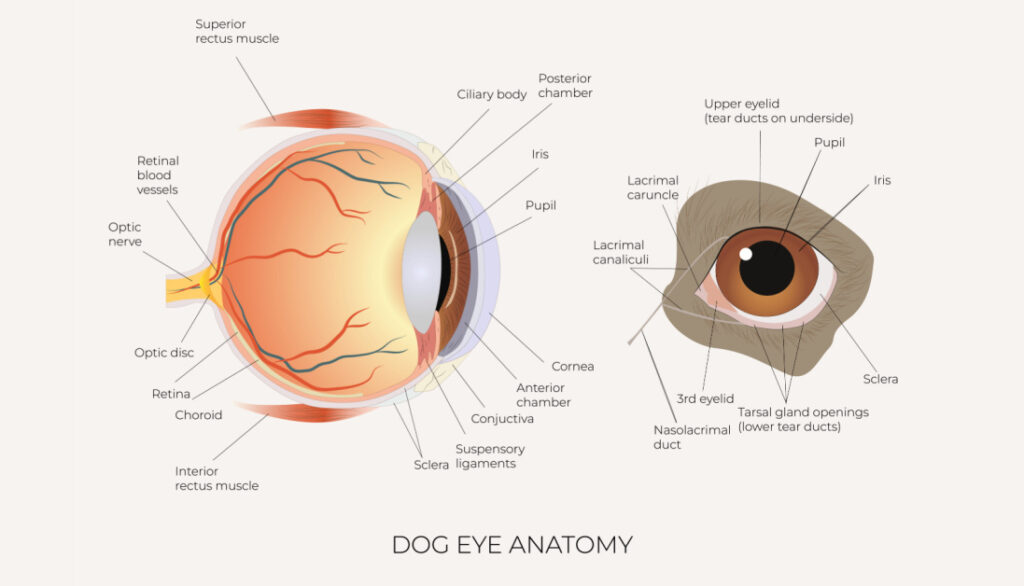
Routine Basset Fauve de Bretagne Eye Care & Maintenance
When it comes to maintaining the Basset Fauve de Bretagne eye health, regular care and maintenance play a crucial role. Maintaining a routine check on your dog’s eyes can help prevent the onset of any eye problems and ensure their overall well-being. Let’s look into some daily and weekly care practices, and understand the role of grooming in eye health.
Daily & Weekly Care & Maintenance
Start by making a habit of inspecting your Basset Fauve de Bretagne’s eyes daily. Look for any signs of redness, swelling, or discharge. If you notice your dog frequently rubbing its eyes or showing signs of discomfort, it’s time to consult a vet.
Also, ensure to clean around your dog’s eyes gently with a damp, soft cloth. This can help remove any dirt or debris that might have accumulated and can cause irritation or infection. However, be careful not to touch the eyeball.
Weekly, you should also check for any changes in your dog’s vision. Observe if they are bumping into things or having difficulty finding their toys or food. These could be indications of vision problems.
Monitor Hair Length, Nail Length, Bath Frequency
Grooming is another essential aspect of maintaining your Basset Fauve de Bretagne’s eye health. Long hair around the eyes can cause irritation and lead to eye problems. Therefore, regularly trim the hair around the eyes to prevent it from poking into the eyes and causing discomfort.
Similarly, long nails can lead to accidental eye injuries, especially if your dog has a habit of scratching its face. Ensure to trim your dog’s nails regularly to avoid such situations.
Lastly, regular baths can help keep your dog clean and reduce the risk of eye infections caused by bacteria or dirt. However, be careful not to get soap or shampoo in their eyes during bath time as this can cause irritation.
Remember, Basset Fauve de Bretagne eye care is an ongoing commitment. Regular check-ups with a vet are essential to keep track of any potential eye problems and address them in their early stages.
By following these steps, you can ensure a healthy and happy life for your Basset Fauve de Bretagne!
Frequently Asked Questions
1. What are common eye health conditions in Basset Fauve de Bretagnes?
Basset Fauve de Bretagnes are prone to various eye health conditions such as cataracts, glaucoma, and progressive retinal atrophy (PRA).
2. How can I identify if my Basset Fauve de Bretagne has an eye health problem?
Watch out for symptoms like redness, excessive tearing, cloudiness, squinting, or any changes in your dog’s vision. If you notice any of these signs, it’s important to consult a veterinarian for a proper diagnosis.
3. Can eye health conditions in Basset Fauve de Bretagnes be treated?
The treatment options for eye health conditions in Basset Fauve de Bretagnes depend on the specific condition. Some conditions may require medication, while others may need surgical intervention. It’s crucial to consult with a veterinarian to determine the best course of action.
4. How can I prevent eye health problems in my Basset Fauve de Bretagne?
To help prevent eye health problems, it’s essential to maintain regular veterinary check-ups and eye examinations. Additionally, keeping your dog’s eyes clean and free from irritants, such as dust or debris, can contribute to their overall eye health.
5. Are Basset Fauve de Bretagnes more prone to eye health issues compared to other dog breeds?
While Basset Fauve de Bretagnes are not specifically known to have a higher risk of eye health issues compared to other breeds, it’s important to be aware of potential conditions and take necessary precautions to ensure their eye health.
